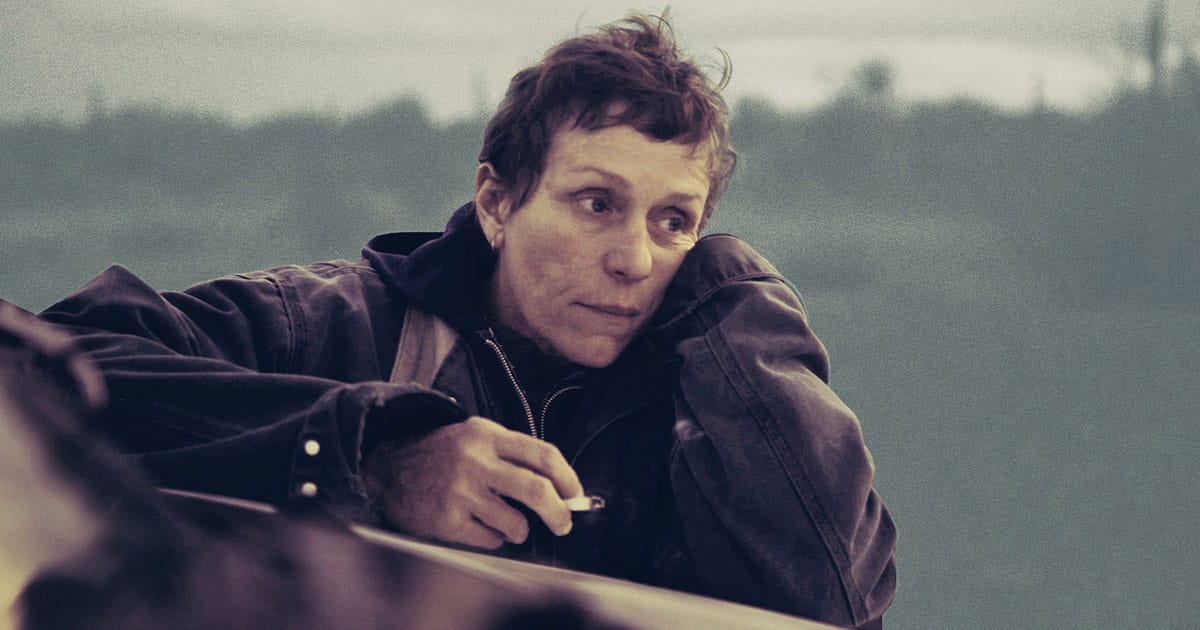“From every mountainside, let freedom ring”– these words of Martin Luther King Jr. reverberate in Nomadland. Chloé Zhao certainly made history with Nomadland as she becomes the first woman of color (and only the second woman after Kathryn Bigelow) to have bagged an Oscar in the Best Director category in 2021.
Allegorically, Nomadland entails the ‘freedom’ of a journey. A journey that stands for life as much as its poetic melancholy. Yes, Zhao makes history and rings the bell of freedom, even if symbolically. But history is also made in the poetic discovery of the motion picture.
A disclaimer indeed- neither this is a movie review nor do I possess the cinematic expertise for reviewing. Instead, it is a personal account of what persists of the movie-watching experience for a person stuck in a pandemic lockdown.
The story revolves around Fern (played by Frances McDormand), a woman in her 60s. She sets off a van-dwelling modern American nomadic journey after the US Gypsum plant closes down, being hit by the recession. It, practically, turns Nevada’s Empire into a deserted land. Empire turns into a land with a fading postal code. It is the same plant housing she called ‘home’ where she stayed with her beloved husband for years.

The course of her fate turns as she loses her husband too. Somewhere, her grief for the beloved and the loss of Empire turn one and inseparable. In her path, she meets new people, learns to let go, and repudiates being bound. Though road-bound, she is not aloof of bonds- these are bonds of love and nature. As oxymoronic as this may be, these bonds set her free.
To begin with, I watched Nomadland over a few days(I was slow). As slow as the sloth of our pandemic lives, perhaps. There was nothing dramatic or even larger than life. And, it may occur to be not as interesting at certain points too. In short, there is nothing extraordinary about the story. But what leaves a lingering impact is how the story is told, the narration unfolds, and each frame transgresses itself to a philosophical universality.
If the film’s duration is comparable to that one element of nature, that may be rain – a lingering splatter of splashes over a long period. It leaves the surrounding gloomier yet greener, drenched yet parched for the upcoming Sun. It is in this paradox of life where Nomadland resides.
As the pandemic has been harrowing our lives for more than a year now, human souls are craving for their nomad lands – their escapades. The wanderlust that inheres in us seeks an expression too. We may not choose to be a nomad literally. But as life proceeds, we find solace in learning to let go- let go of time, space, and perhaps, bits of our souls too.
Amid the pandemic lockdown, we metaphorically traverse into becoming nomads. We cling to our lives and our surroundings by not trying to hold back the times we lost in isolation, the health we lost while healing, and the spaces of work that we lost over those virtual meetings. We are mournful and pensive but are learning to celebrate ourselves in every bit that we can.
Also, read: This Woman Is On A Solo Bike Trip, Exploring India Amidst Pandemic
A memorable scene from the movie shows Fern celebrating New Year all by herself. She laughs heartily as she lit the single firework stick that she has and shouts, ‘Happy New Year’. A ‘happy’ and ‘new’ is almost immediately recognizable to us who are surviving the ravaging pandemic. All we gather amid our days of quarantining is a will to live and celebrate life in whatever ways we can.
We also reckon with the interconnectedness among the nomads as we strive to survive together as people despite state apathy. As we send an oxygen-lead to an unknown, we feel physically drifted but not alone. The mobility that the van blesses Fern with stands for the chord of empathy among us. We feel, therefore, we are- becomes the driving force for us.
Also, read: This Woman Is Willing To Offer Her Breast Milk To Newborns Whose Moms Are Covid Positive
Nomadland dedicates itself to the departed souls hoping to see them again down the road as the nomads embark upon the journey on the road. The souls snatched amid the pandemic are too many. The grief leaves us shattered and overwhelmed, to say the least. Still, we thrive- we cling on to life and hope. Life becomes both our journey and the process to grieve. We tell ourselves- “But I have promises to keep/And miles to go before I sleep”. We wait to find our loved ones again down the road. We look for them in nature.
The Spanish poet, Federico Garcia Lorca, drew on the Spanish folklore conceptualizing duende as a passionate response to art. To me, Nomadland possesses the power of duende that is rooted in being terrestrial, arbitrary, and conscious of grief. It evokes one of those rare emotional responses that inspire one to live despite the grim uncertainties.
The aftertaste of the movie is like a forlorn hope for tranquillity, telling me again and again- this too shall pass. The pandemic makes us feel empty; the losses leave us in despair. Despite that, we learn to choose the emptiness sometimes. It may be painful but hurts lesser than being caged and selfish. Perhaps, that is where the beauty of life lies, in choosing to be a wanderer.

